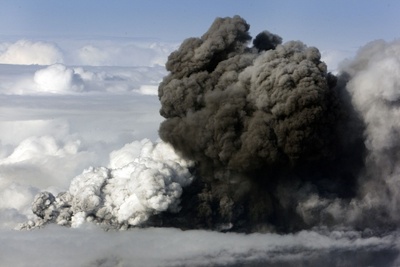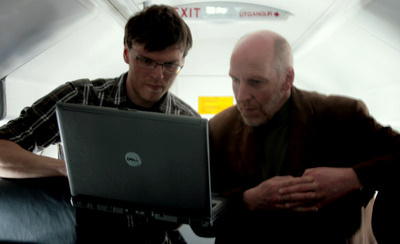It was inevitable.
The airlines--caught between safety and profits-have chosen profits. Although no one is disputing the potential hazards of flying a jet carrying hundreds of people through a plume of volcanic ash, the corporate overlords are pressuring the European regulators to ease the restrictions placed on flights across northern Europe since the volcano at Eyjafjallajökull began erupting last week.
There is certain logic to this. The air passengers, who have camped out in airport hotels over the past few days, are understandingly running out of patience (and, in many cases, funds). Losing $200+ million per day is unsustainable for any industry. With appropriate precautions, most jets would probably not encounter a dense enough plume to knock out their engines.
 The volcano spews black clouds of ash that reach up into the atmosphere to a height of 30,000 feet. Photo: Árni Sæberg. Icelandic Coast Guard/Landhelgisgæslan.
The volcano spews black clouds of ash that reach up into the atmosphere to a height of 30,000 feet. Photo: Árni Sæberg. Icelandic Coast Guard/Landhelgisgæslan.
 The volcano, as photographed yesterday by the Icelandic Coast Guard/Landhelgisgæslan.
The volcano, as photographed yesterday by the Icelandic Coast Guard/Landhelgisgæslan.
Personally, though, I'd rather not be on a jet that "probably" won't crash; I would rather take an extra week or an alternative route to remove that "probably" from the equation.
The authorities are certainly aware that if they allow flights, and one goes down, an indefinite shutdown of all flights in the vicinity would be required. The airlines must know that the lawsuits flowing from such an incident would bankrupt the carrier that decided to give it a go, and scare off many passengers until the Icelandic gods relent.
In many ways, the situation is similar to what we've just gone through in the financial world. The regulators knew what was needed to keep the system working smoothly, but the brokerage firms and investment banks knew that there were big profits to be had if they took a few risks outside the parameters set by the regulators. When push came to shove, the politicians emasculated the laws and cut back on the regulatory staffs, and the Goldman Sachs and Lehman Brothers of the world were off to the races.
The "financial weapons of mass destructions" they created (as Warren Buffet famously called them) eventually went off, and destroyed the sense of security our governments had meticulously constructed since 1929. Glass-Steagall cut into profits, so it had to be eliminated. An SEC focused on reducing risk was cramping their style, so it had to be placed under Wall Street control.
In Iceland, the plutocrats assumed control of the banks, the media, and the government, with spectacular results. As the recently-released legislative "Black Report" outlines, the recklessness of the Icelandic banks was matched only by the arrogance of the borrowers, the duplicity of the politicians, and the ineptitude of the Icelandic Central Bank and other regulators. The country is now in dire straits, and may not fully regain its financial footing for a generation.
In contrast to the overmatched financial regulators, the scientists and public health and safety authorities in Iceland have proven to be thoroughly competent and professional. The evacuation plans were prepared in advance and executed without a hitch. The situation was closely monitored from the beginning, risk to the public was minimized without favoritism, and the political institutions deferred to scientific recommendations without dissent. The volcanoes have not killed any Icelanders (though two died of exposure while trying to approach the first volcano using an unauthorized route). The livestock in the area appears to be doing well. Channels were dug in the highway south of the glacier in a successful attempt to save the area's bridges. When the winds shifted yesterday, warnings immediately went out, and the schools in Vík were closed, and people were instructed to remain indoors.
 Geophysicist Björn Oddsson explains volcano data to Icelandic Finance Minister Steingrímur Sigfússon. Photo: Icelandic Coast Guard/Landhelgisgæslan
Geophysicist Björn Oddsson explains volcano data to Icelandic Finance Minister Steingrímur Sigfússon. Photo: Icelandic Coast Guard/Landhelgisgæslan
Of course, the area surrounding the volcanoes is sparsely populated, and not a lot of money is at stake (well, I imagine the local farmers think they're losing a lot of money, but it's probably not in the nine digits). As soon as money contaminates the decision-making process, I get scared. Our regulators miserably failed us--in Iceland and in the United States--when our financial institutions got involved, and I fear the same result if the airlines get too big a say in this matter.
The airlines have always known that an Icelandic volcanic eruption would take place some day, and that volcanoes often emit vast quantities of ash, yet they appear to have taken no precautions or made any contingency plans to deal with such an eventuality. I expect to hear them take up Alan Greenspan's chant of "no one could have known," but they knew. They just had no incentive to act upon that knowledge. They have always been focused only on next quarter's profits, and probably expect the government to bail them out now.
We know the terrible risk posed by volcanic ash. A NATO F-16 suffered engine damage this weekend when it flew through the plume. In two instances in the 1980s, jets that encountered volcanic ash lost all engines, but managed to restart them. The next one may not be so fortunate.
Let the scientists--not the airlines--decide when it's safe.
